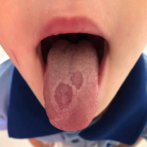Help! Do I have Geographic Tongue?
Help! Do I Have Geographic Tongue? You go into the bathroom to brush your teeth as usual, but this time, you look in the mirror, open your mouth to start brushing and are shocked to see the sight of your tongue. It’s covered with tiny bumps that are pinkish-white and patches of smooth red with slightly raised borders; your tongue looks like a map! You may have a rare condition known as Geographic Tongue. Otherwise known as ‘benign migratory glossitis’, Geographic Tongue is harmless and is not contagious. But there’s no doubt about it, when you discover you have the condition, it can be quite unsettling. Although it can be hard to look at, most people who have Geographic Tongue are quite healthy. What is Geographic Tongue? Geographic Tongue is still a mystery to many, and research continues into its causes. The curious raised bumps of the tongue rash, known as papillae, can come and go from the tongue – leaving behind the smooth red patches that give this condition its name. Often, the patches heal in one area of the tongue and then move to another part. Who does it affect? Studies have not yet confirmed who is most susceptible to Geographic Tongue, but it does affect people of all ages and genders. There is the belief that factors such as stress, allergies, vitamin deficiencies, hormonal imbalances and oral parafunctional habits can be a cause. Although more studies are required, Geographic Tongue can also be hereditary and those with a fissured tongue are at higher risk of developing the condition. How do I know I have it? Apart from self-examination, it’s a good idea to visit us at our Dental Clinic in Sandgate so we can rule out any serious tongue conditions. The examination is quick and painless. We check your tongue and mouth, have you move your tongue around so we can see all areas, touch your tongue gently for sensitivity, and take a closer look at any unusual changes in texture and consistency. Does Geographic Tongue hurt? Some people can have Geographic Tongue and not even realise, while others can experience discomfort, pain or burning, particularly when eating hot and spicy foods or drinking hot beverages. Is there a cure? It can take up to three months for the tongue to go back to normal on its own. If you find the symptoms persist for more than ten days, visit Robert Duhig Dentist for a thorough check. Although there isn’t a cure, our team can recommend treatment options to reduce the discomfort associated with Geographic Tongue. This may include medications such as pain relief, anesthetic mouthwash, antihistamine mouthwash, ointments or vitamin supplements. In addition to the use of...
Read More


